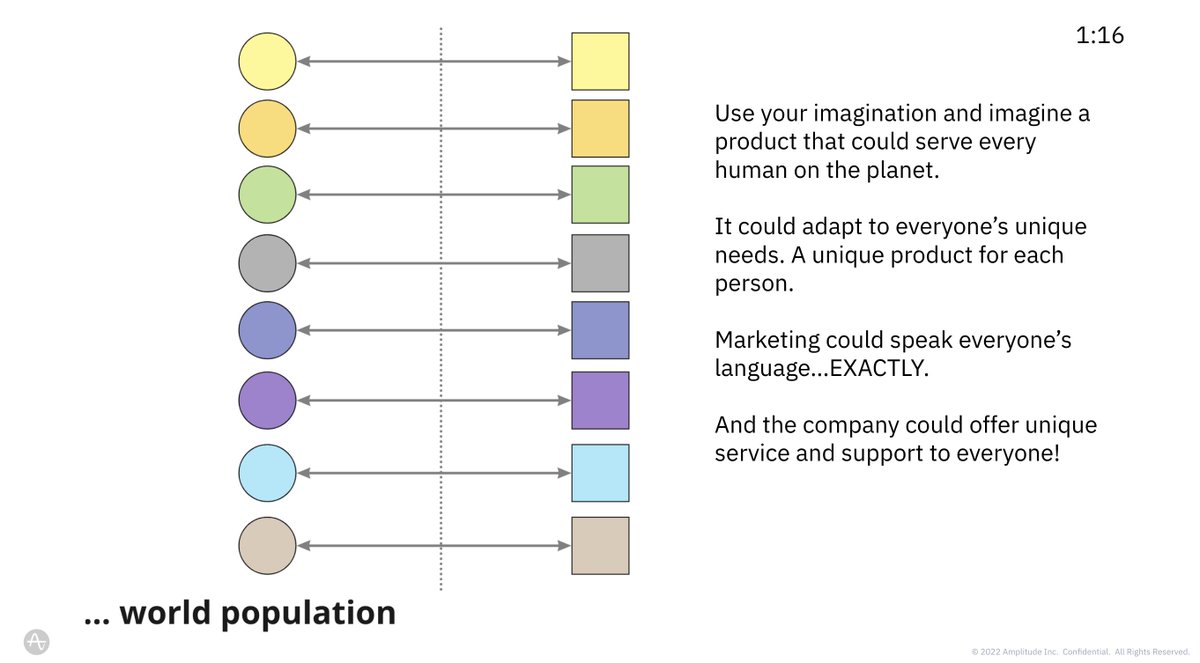
Now that OKRs are a checkbox item in many digital transformation efforts, I wanted to share some observations from working with customers/future customers at @Amplitude_HQ
1/n: You can't OKR your way into a strategy. OKRs aren't a strategy. They "deploy" a strategy
1/n: You can't OKR your way into a strategy. OKRs aren't a strategy. They "deploy" a strategy
2/n
You can't OKR your way into contextual awareness.
OKRs are a time-bound goal setting framework. Not a framework for surfacing assumptions, beliefs, hypotheses, etc.
They are an *output* of those things. Not an input.
You can't OKR your way into contextual awareness.
OKRs are a time-bound goal setting framework. Not a framework for surfacing assumptions, beliefs, hypotheses, etc.
They are an *output* of those things. Not an input.

3/n
It is very important to distinguish between "persistent models" and time-based goals. They are complimentary, however. One creates the foundation for the other.
So many teams are tacking OKRs on to roadmap items, vs. *starting* with a sense of what is important.
It is very important to distinguish between "persistent models" and time-based goals. They are complimentary, however. One creates the foundation for the other.
So many teams are tacking OKRs on to roadmap items, vs. *starting* with a sense of what is important.

4/n
Here is a graceful example of an OKR that spans context and Bet.
This team wants to capture key goals in an onboarding workflow.
Note how one of the Rs refers to the Bet. Another R relates to Project Matching Success Rate which is stable/persistent.
Here is a graceful example of an OKR that spans context and Bet.
This team wants to capture key goals in an onboarding workflow.
Note how one of the Rs refers to the Bet. Another R relates to Project Matching Success Rate which is stable/persistent.

5/n
Say this team wants to improve Activated Accounts (AAs) and focus on Onboarding Efficacy (OE).
They dream up a Bet to surface charts during onboarding.
The OKR can be:
* movement in AAs
* movement in OE
* Bet specific metrics (Chart Interactions)
Say this team wants to improve Activated Accounts (AAs) and focus on Onboarding Efficacy (OE).
They dream up a Bet to surface charts during onboarding.
The OKR can be:
* movement in AAs
* movement in OE
* Bet specific metrics (Chart Interactions)

6/n
Starting with OKRs is a bit like working backwards into practices and good habits. I mean it can work. People figure things out. But they also risk stalling.
Another approach is to work forwards with The Basics
Get the basics in place.
cutlefish.substack.com/p/tbm-1252-the…
Starting with OKRs is a bit like working backwards into practices and good habits. I mean it can work. People figure things out. But they also risk stalling.
Another approach is to work forwards with The Basics
Get the basics in place.
cutlefish.substack.com/p/tbm-1252-the…

8/n
Each team should have a
* mission
* some sense of a persistent model
* some core dashboards that cover that model
* a roadmap of bets (ideally not PRDs)
And dedicated time to REVIEW what's happening.
Each team should have a
* mission
* some sense of a persistent model
* some core dashboards that cover that model
* a roadmap of bets (ideally not PRDs)
And dedicated time to REVIEW what's happening.

9/n
It's important to keep in mind what OKRs are for ... and not for.
They are FOR:
Alignment
Focused ambition
Shared understanding
Collective commitment
Learning & reflection
Not FOR:
Perf. management
Individual commitment
Bolted on to projects
Avoiding communication
It's important to keep in mind what OKRs are for ... and not for.
They are FOR:
Alignment
Focused ambition
Shared understanding
Collective commitment
Learning & reflection
Not FOR:
Perf. management
Individual commitment
Bolted on to projects
Avoiding communication

10/n
OK, rant over.
Here's the webinar I did on this topic
info.amplitude.com/growth-series-…
And the Miro board
miro.com/app/board/o9J_…
And if it takes days/weeks to create a basic dashboard for your Bets and team (let alone tweak the dashboard), consider @Amplitude_HQ. It helps.
OK, rant over.
Here's the webinar I did on this topic
info.amplitude.com/growth-series-…
And the Miro board
miro.com/app/board/o9J_…
And if it takes days/weeks to create a basic dashboard for your Bets and team (let alone tweak the dashboard), consider @Amplitude_HQ. It helps.
• • •
Missing some Tweet in this thread? You can try to
force a refresh







